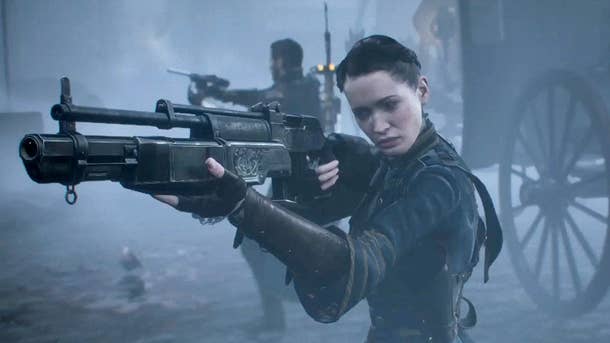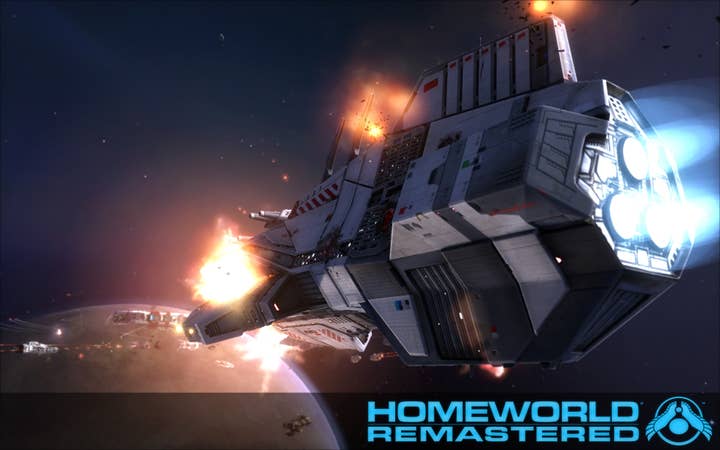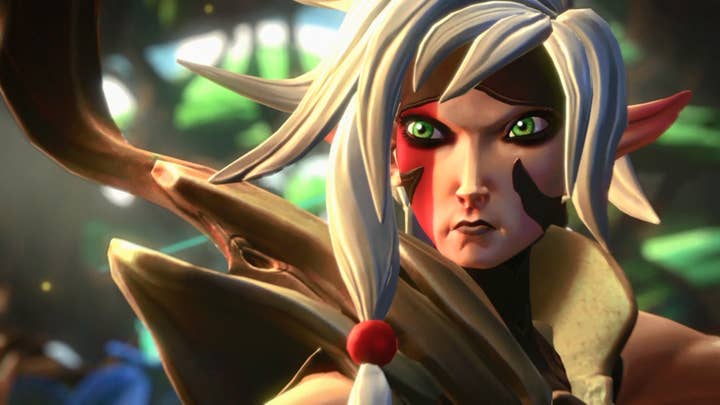Survival of the AAA indies
Randy Pitchford and Ru Weerasuriya discuss the ups, downs and future of AAA independent development
The indie scene has been exploding in recent years, but the term usually draws up images of quirky, relatively low budget titles on Steam, mobile or digital console like PSN. Fuzzy definitions of what it means to be "indie" aside, the number of independent studios actually developing AAA games with budgets in the tens of millions has dwindled, particularly as the gap between the GTAs of the world and mid-tier projects has widened.
As noted by our own Rob Fahey in a recent editorial, "The massive success of a game like GTAV has a dark side; it reflects the increasing polarisation of the high-end games market, in which successful games win bigger than ever, but games which fail to become enormous hits find themselves failing utterly." That doesn't mean that independent studios can't survive in AAA, however, as evidenced by the likes of Bungie, Gearbox, Ready at Dawn, Insomniac, CD Projekt, Turtle Rock, Remedy, and Platinum Games, among others.
Last month, when Ru Weerasuriya of Ready at Dawn gave a talk at DICE on "The Last of the Independents," we chatted (separatetly) with him and Gearbox Software boss Randy Pitchford about taking risks and making tough choices in a highly competitive AAA market. Note that our conversation with Weerasuriya took place prior to the release of The Order 1886, which was unfortunately not received very well.
"It's not easy and I think you choose your battles," Weerasuriya commented on the AAA space. "You choose what matters to you and what decisions you want to make and ultimately that was it. It is true that it's hard, but it's also who we are. More than anything, I think that's what's important right now... That little fear that you have in you as an independent drives you to put some things on the line that you would not normally, take risks that you would not otherwise."
"Owning an IP would be great, but I revel in the fact that IPs need to be nurtured, and if you don't have the capacity to nurture that yourself, I would rather have a partner that can"
Ru Weerasuriya
For Ready at Dawn, forging ahead with next-gen consoles after years of AAA development in the portable space was a risk. So was creating a new IP and investing time and resources in a proprietary engine to run that IP. But ultimately, that's in the DNA of many AAA indies - passion for a project is usually what matters above all else.
"It's not easy waters to navigate, but the reality of it is that it's never been easy waters to navigate. I know that it's harder than ever because of budgets and all that, but I don't think I would have it any other way right now. There are great publisher-owned developers, there are great AAA independent developers, and we'll keep on trucking as long as we can because we just love what we do ultimately. That's why the decision to stay independent is [so important to us], because right now, we love who we are and what we do," Weerasuriya continued.

Most indies in the AAA space recognize what they're good at or when they need to partner up with someone. While Bungie insisted on keeping IP rights to Destiny, Ready at Dawn for example recognized that ceding rights for The Order to Sony as part of its deal was a better choice for that particular situation.
"The reality of it is, IP ownership is great, but I also know that the partnership we have with Sony and the trust we have with Sony put us in a situation where I knew that if this picked up, if this had legs, that they had what it takes as a publisher to pursue what they could out of it. If we were talking about it one day and decided, 'hey, you know what, it would be a great idea to make this graphic novel, it would be a great idea to make something else here.' And sometimes it's hard to think that you could do that on your own. We ultimately are developers," Weerasuriya said.
"Don't get me wrong. Owning an IP would be great, but I revel in the fact that IPs need to be nurtured, and if you don't have the capacity to nurture that yourself, I would rather have a partner that can and that has the ability to do so because I'm a dev, I'm a player. I want to experience those things. If I'm not going to do it myself, then it doesn't matter. That ownership is not going to mean much if it's not brought to fruition."
Pitchford acknowledged the difficulty some independents face in the AAA space because "most of the big publishers' biggest bets are with their internal studios." He added, "The number of productions that are of the highest echelon of production is fewer and fewer because each thing that's the new highest echelon is kind of a new bet. So that vanguard, that is the tip of the spear. So it's always going to be a very small percentage of the overall industry."
Pitchford noted that some of Gearbox's contemporaries, like Valve, Epic and Crytek, of course have complemented their businesses with other sources of revenue like digital platforms (Steam) or tools (Unreal, CryEngine). It's a lot easier to invest in game development when you have money coming in from other areas. Gearbox doesn't have that luxury but the studio has managed to place some smart bets over the years.
"I don't think a traditional publisher would've bet the way we did on Homeworld. I don't think that's possible"
Randy Pitchford
"We're kind of left alone as the big independents that are actually free agents that are not doing first party games. And that's a weird spot to be in, but I don't think it's because we're very good. In fact, I think we still have a huge amount of lessons to learn," Pitchford said. "I just think it's because of the nature of how bets are placed. Somehow, we just happened to be guys that have been capable of creating new things but also have some really strong brands that we built that we own. If you're a publisher that thinks that betting on a Borderlands game is a good idea, well, we own Borderlands and 2K believes in that [and] it's the largest selling game in 2K's history."
Borderlands has been massively successful, but Gearbox has certainly had its share of misses too, like Aliens and Duke Nukem. Whether Gearbox pursues any licensed fare again in the future is up in the air, but Pitchford has never taken on a project he wasn't super excited about, he said. He agrees with Weerasuriya that passion is the ultimate driver.
"When you think about the movie licenses we've been attached to, these aren't our properties at all. We don't have any authority or say on how they're used, but we love them. And the joy of being able to spend some time in that space is just intoxicating. Who's to say if we'll do something like that again? It's really challenging. I think every single thing we've ever done provides us more experience and understanding that might help us in the future but it might also make us believe we can get around those normal obstacles even more because we're aware of them more and maybe we'll do something like that again.
"I kind of take each moment as it comes. But I do know one thing. You have no hope if you're not passionate about it. And all of the things that we've done - and you can see if you go back and watch me talk about the things that we've done - I won't do anything unless I'm going to get super passionate about it. Results vary, but if you don't start with that, you have no hope."
Gearbox's newest passion plays are a remastered in 4K Homeworld (which it acquired when THQ went belly up) and another new IP with MOBA elements called Battleborn. For Homeworld, Gearbox believes so strongly in the property that it's decided to take on the role of publisher.

"It was just languishing for so long under THQ stewardship and it was just sad to us so we bought it and then we thought, 'ok, now what do we do?' And we thought, well we can't even play the originals, because they don't even work on modern platforms, so let's make that happen," Pitchford explained. "And then we got in there and...we had to rebuild the whole game to make it doable. We still have the classic versions also. We could've just done that really fast and put that out on Steam and made, probably, our money back, but we decided to invest and do a really good job and I'm proud of it. I don't know if that's a business move, but it's definitely fun, and it's experiential. We're learning a lot about publishing. And we're learning a lot about being closer with our customer. And we're calling the shots there, so we're feeling like our business exists.
"I'm not sure that it'll be a profitable move, but I hope it is, because if we can be profitable going overboard, making sure you're doing the most justice to what you're working with, then that's really good for our industry... I don't think a traditional publisher would've bet the way we did on Homeworld. I don't think that's possible," he added.
Don't expect Gearbox to suddenly publish everything itself, however. Pitchford said he'd much rather rely on publishers like 2K to handle the logistics of global distribution and sales. "Publishers have a really important role to play with solving problems that creatives aren't interested in. You really need that symbiotic relationship to be most effective," he said.
Having the ability to work with the right talent is crucial as well, Pitchford noted. For the remastered Homeworld, Gearbox brought on the founders of Relic, original creators of the IP. And for new project Battleborn, Gearbox is not only leveraging art director Scott Kester, who designed a lot of the characters in Borderlands, but the studio is also tapping Michel Gagne, who was responsible for the effects in The Iron Giant and consults on effects for Pixar movies (most recently Brave).
"The key is respecting the value that other people are bringing. Giving them a return on that value. Not being too greedy about it"
Randy Pitchford
These sorts of personnel decisions can go a long way to ensuring a project's success, but Pitchford also stressed that building trust with people is another aspect. Give people respect and fair deals and your reputation will grow.
"The key is respecting the value that other people are bringing. Giving them a return on that value. Not being too greedy about it. I think that people that partner with Gearbox will probably report that that's a really good thing to do from a business perspective. They tend to do really well when they partner with us," he said.
That holds true for when Gearbox licenses out its own IP, like it did with Brothers in Arms on mobile with Gameloft and Telltale's Tales from Borderlands, Pitchford added.
"We're really good when we're in the financier role because we know what it's like to be subservient and we're also really generous with how much freedom we afford people with our brands, because we know what it's like to work with other people's brands and we don't get to do what we know is necessary to make a good game and we have all the constraints put on us. So I think we're really good in those regards and it leads to the results that you're seeing."
While AAA independents may feel like a rare breed nowadays, Pitchford doesn't see them fading away. There's just too much talent and too much interest in the space for that to happen. "Because there's more independent developers than we've ever seen in our history, some percentage of them are going to have some ambition to do hyper relevant stuff and some of them are going to grow and amass enough credibility to actually do that," he said.

